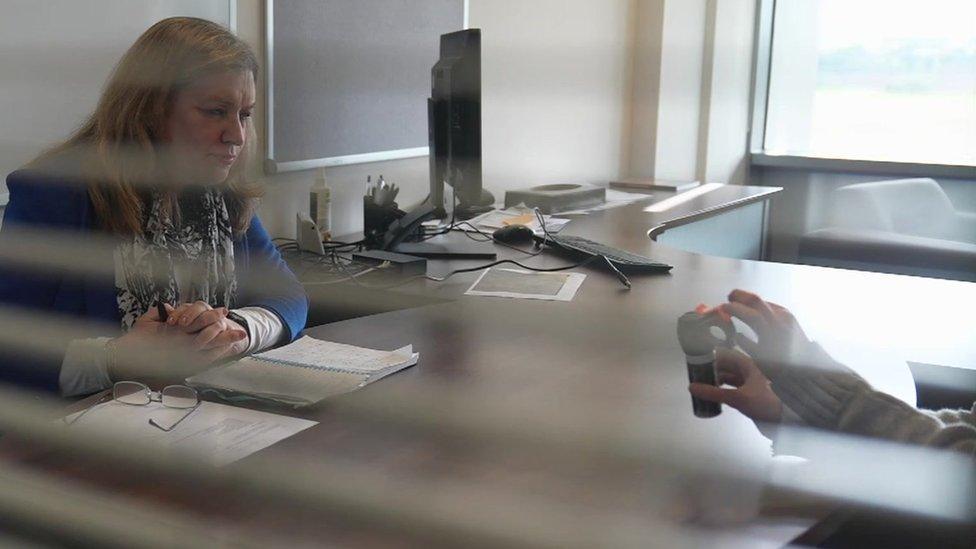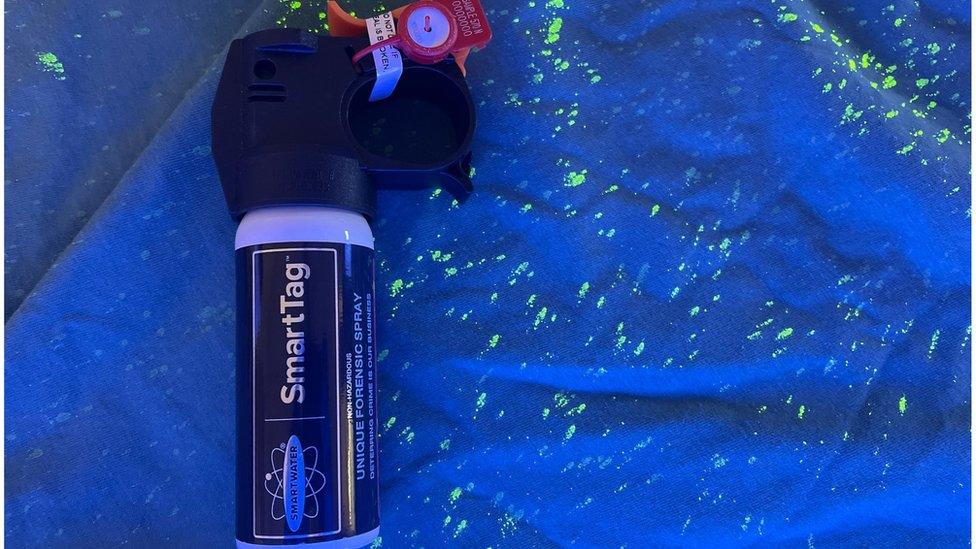Domestic abuse: Forensic marker spray helps victims rebuild lives
- Published

Sarah demonstrates her SmartWater device to BBC correspondent June Kelly (L)
A domestic abuse victim is slowly rebuilding her life thanks in part to a forensic marker spray she has been given by West Yorkshire Police. The gadget is to be used if her abuser shows up, and other police forces are under growing pressure to adopt similar measures.
Sarah (not her real name) found herself trapped in her own home during the first Covid lockdown.
Her abuser arrived one day "for a chat", she says, and she simply could not get rid of him. It was her flat, but he moved in and forced her into a relationship.
After months of physical and emotional abuse, Sarah realised she had to get away when the man threatened her with a knife.
"He was really controlling and he used to spy on me and stuff like that. It was jealous and coercive behaviour," she said.
"Like everyone I'd had my freedom taken away from me, and I was living with this person who was abusing me so it was a really hard time. Because he wasn't seeing his friends, he was taking everything out on me."
Sarah describes how for months she was too scared to leave. The knife episode was the tipping point.
She knew her abuser had broken the law but she was initially reluctant to go to the police. Eventually Sarah was persuaded - but even as she waited in the police station to make a report, she was terrified.
"I was really scared that he was going to drive past and see me."
She had to move out of the flat which had been hers because it was not considered safe.
Her abuser was placed under a restraining order and then arrested and charged by West Yorkshire Police.
When the case came to court, Sarah had to testify against him.
"I was behind a screen but I could still hear his voice and he was shouting. I was relieved the police were there and he couldn't do to me what he had before, and I was finally getting it sorted."
Her abuser was convicted and jailed.
Locks and alarms
When he was released a few months ago, having served his sentence, West Yorkshire Police put in place a series of measures to help Sarah.
"I've got alarms on all my doors. I've got letterbox locks and I've got SmartWater," says Sarah.
SmartWater is a forensic liquid which shows up under ultraviolet light. Sarah knows that if she sprays it on her abuser it will stay on his skin and clothing for weeks.
Holding the bottle which she always has with her, she explains: "It releases water which has a unique code which the police can track. It helps my anxiety.
"Before I had this, I wasn't leaving the house."

Police say that domestic abuse can often be difficult to prosecute since many crimes occur behind closed doors. SmartWater can trace someone back to a location and links the perpetrator to the specific batch of water that was sprayed.
In February the UK saw the first case of someone being convicted and jailed for domestic abuse after being sprayed with SmartWater.
Sarah's attacker has not approached her since his release from prison, but the SmartWater has given her confidence. "I just know that I can spray this at him before he has a chance to even think about running off," she said.
"So it's a big reassurance to know that even if they don't catch him there and then, they can catch him a few months down the line."
Police overhaul
The recent litany of high-profile murders of women and girls has added renewed energy to efforts to keep women safer, and raised crucial questions for police.
Last October, Deputy Chief Constable Maggie Blyth was appointed national police lead for violence against women and girls for England and Wales.
In December, a new policy framework, external set out plans to remodel the police response to female victims of violence, with the first report on how forces are performing due in November.
"I want to improve the trust and confidence women and girls have in policing," writes DCC Blyth in the foreword to her first progress update, published on Thursday.
In the report, she outlines improvements with a focus on pursuing perpetrators, providing safer spaces for women and working to ensure they have more trust and confidence in the police.
In response, the Association of Police and Crime Commissioners, which oversees forces, says: "More still needs to be done to ensure violence is prioritised across every police force, ensuring victims are effectively supported and offenders apprehended."
Andrea Simon, director of the End Violence Against Women Coalition, said that while there are "pockets of progress", they are "highly localised".
"The culture of policing is not sufficiently transformed to be able to really deliver on the commitments set out," said Ms Simon.
"Policing has lost the trust and confidence of many of the communities it serves, including women."
Supt Lee Berry, who has responsibility for West Yorkshire Police's response to violence against women and girls, acknowledged that despite previous work, "we have got to improve how we perform and how we work with our victims".
He added: "Certainly over the last 12 months, consolidating all these crime types together under the heading of violence against women and girls, it is bringing in an emphasis now that I've not seen, to be honest, within 26 years of policing."
In a statement, The Home Office agreed that while improvements are encouraging, "there is more to do".
"We are prioritising prevention, supporting survivors and strengthening the pursuit of perpetrators," said a spokesperson.
Sarah is keen to do her bit and now works with a local domestic abuse service to tell other victims her story and give them hope.
"I'm a more confident person," she says.
"Not many people know about jealous and coercive relationships. It's usually abusive relationships. I just want to help anyone else, especially if they haven't had good relationships with the police before."